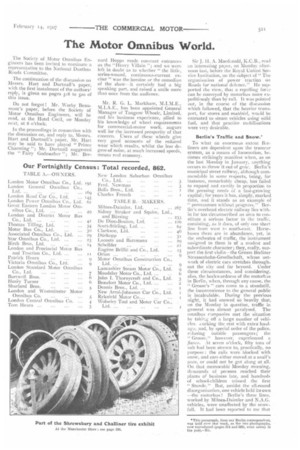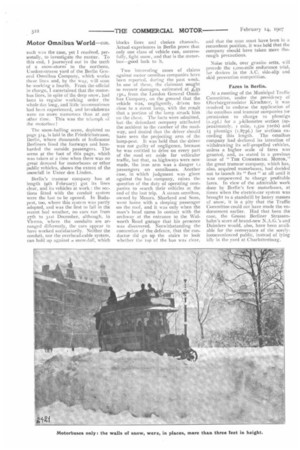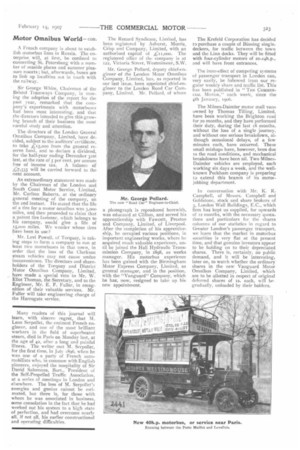The Motor Omnibus World.
Page 9

Page 10

Page 11

If you've noticed an error in this article please click here to report it so we can fix it.
The Society of Motor Omnibus Engineers has been invited to nominate a representative to the National Dustless Roads Committee.
The continuation of the discussion on Messrs. Hart and Durtnall's paper, with the first instalment of the authors, reply, is given on pages 518 to 52o of this issue.
Do not forget ! Mr. Worby Beaumont's paper, before the Society of Motor Omnibus Engineers, will be read, at the Hotel Cecil, ore Monday next, at 8 o'clock.
In the proceedings in connection with the discussion on, and reply to, Messrs. Hart and Durtnall's paper, Mr. Hart may be said to have played "Prince Charming "; Mr. Durtnall suggested the " Fairy Godmother "; Mr. Ber
nard Hopps made constant entrances as the "Heavy Villain "; and we were left in doubt as to whether " the little, series-wound, continuous-current exciter " was the heroine or the comedian of the show—it certainly had a big speaking part, and raised a smile more than once from the audience.
Mr. R. G. L. Markham, M.I.M.E., has been appointed General .Manager of Tangent Wheek, Limited, and his business experience, allied to his knowledge of wheel requirements for commercial-motor work, augurs well for the increased prosperity of that concern. Users of these wheels give very good accounts of the reduced wear which results, whilst the less degree of noise, at much increased speeds, means real economy.
Sir j. ii. A. Macdc.nald, K.C.B., read an interesting paper, on Monday afternoon last, before the Royal United Service Institution, on the subject of " The organisation of power traction on Roads for national defence." He supported the view, that a repelling forze can be conveyed by motorbus more expeditiously than by rail. It was pointed out, in the course of the discussion which followed, that the heavier transport, for stores and materiel, would be entrusted to steam vehicles using solid fuel, and that practice mobilisations were very desirable.
Berlin's Traffic and Snow.*
To what an enormous extent Berliners are dependent upon the tramcar system, as a means of locomotion, becomes strikingly manifest when, as on the last Monday in January, anything occurs to throw it out of gear. Berlin's municipal street railway, although commendable in some respects, being, for instance, remarkably cheap, has failed to expand and ramify in proportion to the pressing needs of a fast-growing capital ; for years it has, simply, marked time, and it stands as an example of " permanence without progress." Berlin's overhead electric railway lies within far too circumscribed an area to constitute a serious factor in the traffic, consisting, as it does, of only one short line from west to south-east. Horsebuses there are in abundance, yet, in the orchestra of traffic, the instrument assigned to them is of a modest and subordinate character; they, really, support the first violin—the Grosse Berliner Strassenbahn-Gesellschaft, whose network of electric cars stretches throughout the city and far beyond. tinder these circumstances, and considering, also, the backwardness of the motorbus in Berlin, when, through any cause, the " Grosse's " cars come to a standstill, the inconvenience to the general public is incalculable. During the previous night, it had snowed so heavily that, on the Monday in question, traffic in general was almost paralysed. The omnibus c-,mpanies met the situation by takir.g off a large number of vehicles. marking the rest with extra haulage, and, by special order of the police, mfusing outside passengers; the " Grosse," however, experienced a fiasco. At seven o'clock, fifty tons of salt had been strewn to, practically, no purpose : the rails were blocked with snow, and cars either moved at a snail's pace, or could not be got along at all. On that memorable Monday morning, thousands of persons reached their places of business late, and hundreds of school-children missed the first " Stunde." But, amidst the all-round disorganisation, one vehicle held its own —the motorbus ! Berlin's three lines, worked by Milnes-Daimler and N.A.G. vehicles, were unaffected by the snowfall. It had been reported to me that such was the case, yet I resolved, personally, to investigate the matter. To this end, I journeyed out in the teeth of a snow-storm to the northern, Usedomstrasse yard of the Berlin General Omnibus Company, which works these lines and, by the way, will soon be working a fourth. From the official in charge, I ascertained that the motorbus lines, in spite of the deep snow, had been in regular working order the whole day long, and little inconvenience had been experienced, and breakdowns were no more numerous than at any other time. This was the triumph of the motorbus I
The snow-balling scene, depicted on page 514, is laid in the Friedrichstrasse, Berlin, where thousands of frolicsome Berliners lined the footways and bombarded the outside passengers. The scene at the foot of this page, which was taken at a time when there was no great demand for motorbuses or other public vehicles, shows the extent of the snowfall in linter den Linden.
Berlin's tramcar company has at length (9th February) got its lines clear, and its vehicles at work : the sections fitted with the conduit system were the last to be opened. In Budapest, too, where this system was partly adopted, and was the first to fail in the recent bad weather, no cars ran from 27th to 3151 December, although, in Vienna, where the conduits are arranged differently, the cars appear to have worked satisfactorily. Neither the conduit, nor the overhead-cable system, can hold up against a snow-fall, which blocks lines and chokes channels. Actual experiences in Berlin prove that only one class of vehicle can, successfully, light snow, and that is the motorbus—good luck to it.
Two interesting cases of claims against motor omnibus companies have been reported, during the past week. In one of these, the claimant sought to recover damages, estimated at
15s., from the London General Omnibus Company, on the ground that the vehicle was, negligently, driven too close to a street lamp, with the result that a portion of the lamp struck him on the chest. The facts were admitted, but the defendant company attributed the accident to the camber of the roadway, and denied that the driver should have seen the projecting arm of the lamp-post. It was held that the driver was not guilty of negligence, because he was entitled to drive on every part of the road set aside for vehicular traffic, but that, as highways were now made, the iron arm was a danger 1.3 passengers on. omnibuses. Another case, in which judgment was given against the bus company, raises the question of the duty of operating companies to search their vehicles at the end of the last trip. A steam omnibus, owned by Messrs. Sharland and Sons, went home with a sleeping passenger on the roof, and it was only when the man's head came in contact with the archway at the entrance to the \Valworth Road garage that his presence was discovered. Notwithstanding the contention of the defence, that the conductor did go up the stairs to look whether the top of the bus was clear,
and that the man must have been in a recumbent position, it was held that the company should have taken more thorough precautions.
Noise trials, over granite setts, will precede the r,000-mile endurance trial, for devices in the A.G. side-slip and skid prevention competition.
Fares in Berlin.
At a meeting of the Municipal Traffic Committee, under the presidency of OberbUrgermeister Kirschner, it was resolved to endorse the application of the omnibus and tramcar companies for permission to charge to pfermigs (1.25d.) for a 3-kilometre section (approximately, i mile, 1,520 yards) and 15 pfennig,-s (i.875(1.) for sections exceeding this length. The omnibus company had declared its intention of withdrawing its self-propelled vehicles, unless a higher scale of fares was granted, and, as stated in a previous issue of "THE COMMERCIAL MOTOR," the great tramcar company, which has, also, acquired motorbuses, had decided not to launch its " fleet " at all until it was empowered to charge profitable fares. In view of the admirable work done by Berlin's few motorbuses, at times when the electric-car system was brought to a standstill by heavy masses of snow, it is a pity that the Traffic Committee could not have made the endorsement earlier. Had that been the case, the Grosse Berliner Strassenbahn's score of brand-new N.A.G.'s and Daimlers would, also, have been available for the conveyance of the sorelyinconvenienced public, instead of lying idly in the yard at Charlottenburg.
A French company is about to establish motorbus lines in Russia. The enterprise will, at first, be confined to connecting St. Petersburg with a number of seaside places and summer pleasure resorts; but, afterwards, buses are to link up localities not in touch with the railway.
• Sir George White, Chairman of the Bristol Tramways Company, in moving the adoption of the report for the past year, remarked that the company's experiments with motorbuses had been most interesting, and that the directors intended to give this growing branch of their business the most careful study and attention.
The directors of the Landon General Omnibus Company, Limited, have decided, subject to the auditors' certificate, to take ,,15,000 from the general reserve fund, and to declare a dividend, for the half-year ending December 31st last, at the rate of 5 per cent, per annum free of income tax. A balance dl 4,-7,535 will be carried forward to the next account.
An extraordinary statement was made by the Chairman of the London and South Coast Motor Service, Limited, Mr. Canton Roberts, at the ordinary general meeting of the company, on the znd instant. He stated that the life of a tire for a motor omnibus was 3,000 miles, and then proceeded to claim that a patent tire fastener, which belongs to his company, would give a life of 15,000 miles. We wonder whose tires have been in use?
Mr. Levi Powell, of Torquay, is taking steps to form a company to run at least two motorbuses in that town, in order that the loss of the Clarkson steam vehicles may not cause undue inconvenience. The directors and shareholders of the Torquay and District Motor Omnibus Company, Limited, have made a special vote to Mr. W. Eliot Thomas, the Secretary, and to the Engineer, Mr. E. F. Fuller, in recognition of their valuable services. Mr. Fuller will take engineering charge of the Harrogate service.
The Renard Syndicate, Limited, has been registered by Ashurst, Morris, Crisp and Company, Limited, with an authorised capital of E,11,000. The registered office of the company is at 122, Victoria Street, Westminster, S.W.
Mr. George Pollard, deputy chief-engineer of the London Motor Omnibus Company, Limited, has, as reported in our last issue, been appointed chief-engineer to the London Road Car Company, Limited. Mr. Pollard, of whom a photograph is reproduced herewith, was educated at Clifton, and served his apprenticeship with Fawcett, Preston and Company, Limited, of Liverpool_ After the completion of his apprenticeship, he occupied various positions, in important engineering works, where he acquired much valuable experience, until he joined the Hall Hydraulic Transmission Company, in 1898, as works manager. His motorbus experience has been gained with the Birmingham Motor Express Company, Limited, as general manager, and in the position, with the "Vanguard" Company, which he has, now, resigned to take up his new appointment. The Krefeld Corporation has decided ta purchase a couple of Bussing singledeckers, for traffic between the town and the Linn docks. They will be fitted with four-cylinder motors of 2o-24h.p., and will have front entrances.
The inter-effect of competing systems of passenger transport in London can, very easily, be followed from our regular weekly share and traffic list. This has been published in "THE CODDLER(Ant. MOTOR," each week, since the 4th January, 1906.
The Milnes-Daimler motor mail vans owned by Thomas Tilling, Limited, have been working the Brighton road for 20 months, and they have performed their duty, during the last 18 months, without the loss of a single journey, and without one serious breakdown, although occasional delays, of a few minutes each, have occurred. These small mishaps have, however, been due to the road conditions, and mechanical breakdowns have been nil. Two MilnesDaimler vehicles are employed, each working six days a week, and the wellknown Peckham company is preparing to extend this branch of its motorjobbing department.
In conversation with Mr. K. R. Campbell, of Messrs_ Campbell and Goldstone, stock and share brokers of 3, London Wall Buildings, E.G., which firm has kept us supplied, for upwards of 12 months, with the necessary quota_ dons and particulars for the shares columns of our statistics in regard to Greater London's passenger transport, we learn that the market in motorbus securities is very flat at the present time, and that genuine investors appear to be holding on to their depreciated shares. There is, certainly, no public demand, and it will be interesting, later on, to watch whether the ordinary shares in the new Vanguard Motor Omnibus Company, Limited, which are to be allotted in respect of original deferred shares of is. each, will be. gradually, unloaded by their holders.
























